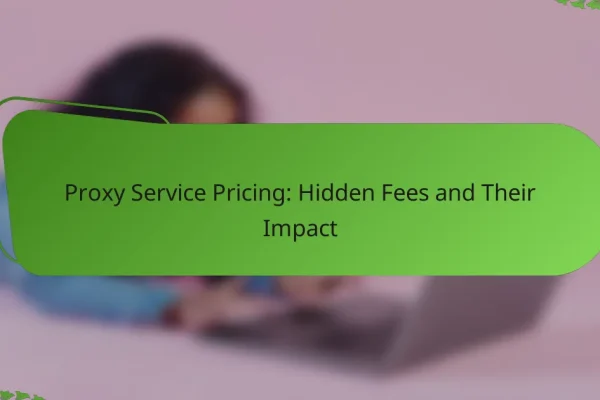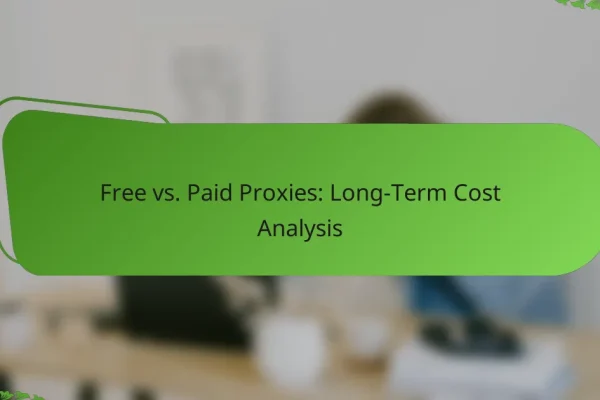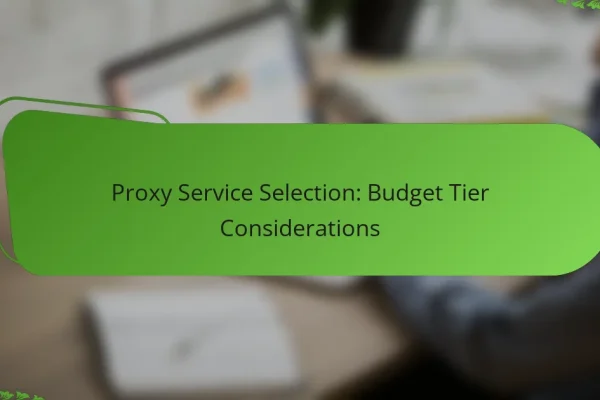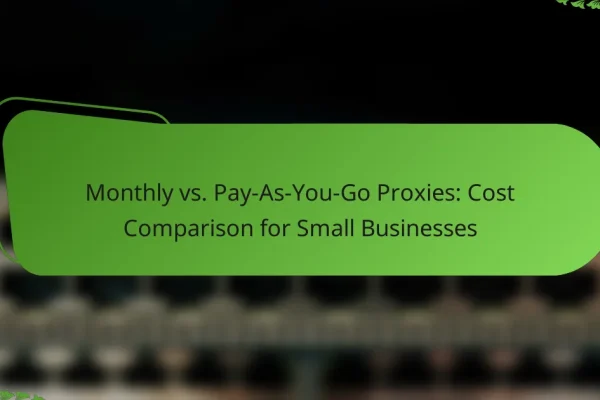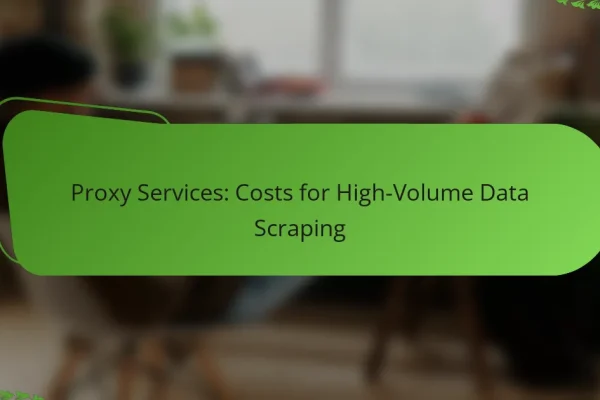What are the costs associated with proxy services in the UK?
The costs of proxy services in the UK can vary significantly based on the type of service, usage patterns, and additional features. Users should consider monthly fees, pay-per-use options, and other potential charges when budgeting for these services.
Monthly subscription fees
Monthly subscription fees for proxy services typically range from £10 to £100, depending on the provider and the features included. Basic plans usually offer limited bandwidth and fewer IP addresses, while premium plans provide enhanced security and faster speeds.
When selecting a subscription, evaluate your specific needs, such as the number of users and the required bandwidth. Some providers offer discounts for annual payments, which can reduce overall costs.
Pay-per-use pricing
Pay-per-use pricing allows users to pay only for the bandwidth they consume, making it a flexible option for those with fluctuating needs. Rates can vary widely, often falling between £0.01 and £0.10 per GB, depending on the provider.
This model is ideal for businesses that require proxies only occasionally or for specific projects. However, it can become costly if usage spikes unexpectedly, so monitoring consumption is crucial.
Setup and installation costs
Setup and installation costs for proxy services can range from free to several hundred pounds, depending on the complexity of the setup. Many providers offer self-service options that incur no additional fees, while managed services may charge for installation assistance.
Consider whether you have the technical expertise to handle installation or if you will need professional help. This decision can significantly impact your initial investment.
Bandwidth usage charges
Bandwidth usage charges are often a critical component of proxy service costs, especially for pay-per-use models. Providers may impose limits on monthly bandwidth, with overage fees typically ranging from £5 to £50 for each additional GB.
To avoid unexpected charges, assess your typical usage patterns and choose a plan that aligns with your needs. Some providers offer unlimited bandwidth options, which can be more cost-effective for high-usage scenarios.
Additional feature costs
Many proxy services offer additional features, such as enhanced security, dedicated IP addresses, and advanced analytics, which can incur extra costs. These features can range from £5 to £30 per month, depending on the service.
Evaluate the necessity of these features based on your specific requirements. Investing in essential features can improve performance and security, but unnecessary add-ons can inflate costs without providing value.
How do pricing models vary among proxy service providers?
Pricing models for proxy services can differ significantly based on the provider, affecting how users pay for access and the features included. Understanding these variations helps users choose a service that aligns with their needs and budget.
Fixed pricing vs. variable pricing
Fixed pricing offers a set rate for a specific service or package, making it easier for users to budget their expenses. For example, a provider might charge a flat fee of $50 per month for a certain number of proxies, regardless of usage.
In contrast, variable pricing fluctuates based on usage or demand, which can lead to lower costs for light users but higher expenses for those with heavy usage. This model may charge users based on the number of requests made or the amount of data transferred, which can be beneficial for businesses with unpredictable needs.
Tiered pricing structures
Tiered pricing structures offer multiple packages at different price points, allowing users to select a plan that best fits their requirements. For instance, a basic plan might start at $20 per month for limited access, while a premium plan could cost $100 per month for enhanced features and higher limits.
This model encourages users to scale their services as their needs grow, but it’s essential to evaluate the features included in each tier. Users should consider what they truly need to avoid paying for unnecessary extras.
Freemium models
Freemium models provide basic services for free while charging for premium features. This approach allows users to test the service before committing financially, which can be advantageous for those new to proxy services.
However, users should be aware that free versions often come with limitations, such as slower speeds or fewer available proxies. It’s crucial to assess whether the free service meets your needs or if the premium upgrade is necessary for optimal performance.
What factors influence the cost of proxy services?
The cost of proxy services is influenced by several key factors, including the type of proxy, the geographic location of servers, the number of IP addresses, and the service level agreements (SLAs) offered. Understanding these elements can help you make informed decisions when selecting a proxy service that fits your budget and needs.
Type of proxy (residential vs. datacenter)
The type of proxy significantly impacts pricing. Residential proxies, which route traffic through real devices, tend to be more expensive due to their higher reliability and lower risk of being blocked. In contrast, datacenter proxies are generally cheaper as they originate from data centers and can be easily scaled, but they may face more restrictions from websites.
When choosing between residential and datacenter proxies, consider your specific use case. For tasks requiring high anonymity and reliability, residential proxies are often worth the investment. For less sensitive tasks, datacenter proxies can provide a cost-effective solution.
Geographic location of servers
The geographic location of proxy servers can also affect costs. Proxies located in high-demand regions, such as North America or Western Europe, may be priced higher due to their popularity and the associated infrastructure costs. Conversely, proxies in less popular regions may offer lower prices but could have slower speeds or less reliability.
When selecting a proxy service, assess whether you need access to specific geographic locations. If your goal is to target a particular market, investing in proxies from that region can enhance performance and effectiveness.
Number of IP addresses
The number of IP addresses you require can influence the overall cost of proxy services. Many providers offer tiered pricing based on the number of IPs, with bulk purchases often resulting in discounts. For example, a plan with a few IP addresses may be affordable, but scaling up to hundreds or thousands can significantly increase costs.
Evaluate your needs carefully. If you plan to use multiple IPs for different tasks, consider a provider that offers flexible packages or unlimited IP options to avoid unexpected charges.
Service level agreements (SLAs)
Service level agreements (SLAs) define the quality and reliability of the proxy service, which can also affect pricing. Higher-tier SLAs typically guarantee faster speeds, lower downtime, and better customer support, leading to higher costs. Basic SLAs may be cheaper but could come with limitations on performance and availability.
When reviewing SLAs, look for guarantees that align with your operational needs. If your tasks are time-sensitive, investing in a service with a robust SLA can save you from potential issues down the line.
What are the hidden costs of using proxy services?
Hidden costs of proxy services can significantly impact your overall budget. These costs often include overage charges, customer support fees, and integration expenses, which may not be immediately apparent when selecting a provider.
Overage charges
Overage charges occur when your usage exceeds the limits set by your proxy service plan. Many providers offer tiered pricing, where basic plans include a specific data allowance, and exceeding this can lead to additional fees that may accumulate quickly.
To avoid unexpected costs, carefully review the terms of your plan and monitor your usage regularly. Consider choosing a plan that offers unlimited data if your needs are likely to fluctuate significantly.
Customer support fees
Some proxy services charge extra for premium customer support, which can include faster response times or dedicated account managers. While basic support may be included in your plan, relying on premium services can add to your overall expenses.
Evaluate the level of support you anticipate needing and factor this into your budget. Opt for providers that offer comprehensive support without hidden fees if you expect to require assistance frequently.
Integration costs with existing systems
Integrating proxy services with your existing systems can incur additional costs, especially if custom configurations or development work is needed. This may involve hiring external developers or purchasing additional software to ensure compatibility.
To minimize integration costs, choose a proxy service that offers easy compatibility with your current infrastructure. Conduct a thorough assessment of your systems before selecting a provider to understand potential integration challenges and expenses.
How can businesses choose the right proxy service based on cost?
Businesses can choose the right proxy service based on cost by evaluating their specific needs against the pricing models offered. Factors such as bandwidth requirements, the number of simultaneous connections, and the level of anonymity desired will influence the overall cost and value of the service.
Cost-benefit analysis
A cost-benefit analysis involves comparing the expected benefits of using a proxy service against its costs. Businesses should consider how proxies can enhance security, improve access to geo-restricted content, and boost web scraping efficiency. For instance, if a proxy service costs $50 per month but saves a business $200 in operational costs through improved data collection, it may be worth the investment.
When conducting this analysis, it’s essential to factor in both direct costs, like subscription fees, and indirect costs, such as potential downtime or loss of productivity. A thorough understanding of these elements helps in making an informed decision.
Comparison of features vs. pricing
When comparing proxy services, businesses should evaluate the features offered relative to their pricing. Common features include the type of proxies (residential vs. datacenter), connection speed, and customer support. For example, a service that offers high-speed residential proxies may be priced higher but can provide better results for specific use cases like web scraping.
Creating a comparison table can help visualize the differences. List services alongside their key features and monthly costs to identify the best value. Pay attention to any hidden fees, such as charges for additional bandwidth or connections, which can significantly affect the total cost.
